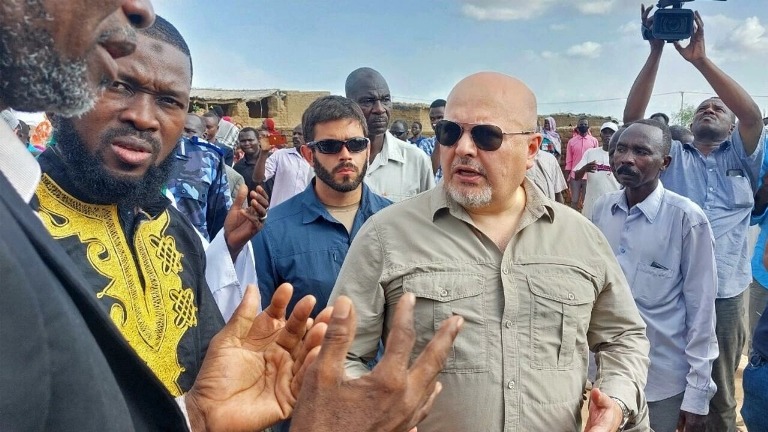ICC prosecutor ends visit to Sudan with promises of cooperation
August 24, 2022 (KHARTOUM) – The International Criminal Court (ICC)’s delegation concluded a 5-day-visit to Sudan with pledges from the military-led government to cooperate with the war crimes tribunal to achieve justice in Darfur.
Before leaving Sudan, ICC Prosecutor Karim Khan and the head of the visiting delegation held a press conference on Wednesday 24 August.
In a briefing attended by Western diplomats, Khan praised the cooperation of the Sudanese authorities with the delegation during his second visit to Sudan as he visited recalcitrant displacement camps where the residents renewed their call for justice and rejected the military-led government.
“I don’t take for granted the fact that we are here, it’s been a long time but it’s certainly better than it was during the era of President Omer al-Bashir,” he said adding that his delegation got multi-entry visas.
While Khan was visiting IDP camps in Kalma of South Darfur, Hamidiya and Hasahisa of Central Darfur, his deputy Nazhat Shameem Khan of Fiji held meetings with senior government officials.
He only met with the head of the Sovereign Council Abdel Fattah al-Burhan and his deputy Mohamed Hamdan Daglo “Hemetti”.
He told reporters that al-Burhan pledged full cooperation with the ICC in presence of the acting minister of Justice who serves as the focal point of communications between the Sudanese government to the ICC.
In his report to the Security Council over the period from January to August 2022, Khan acknowledged the provision of multiple-entry visas and support with respect to a limited number of requests for assistance.
“However, the overall picture during the reporting period has remained challenging and represents a backwards step from the strong period of cooperation enjoyed by the Office from Sudanese authorities from February to October 2021,” reads the report without mentioning the military coup.
The prosecutor told reporters he failed to meet the ousted President al-Bashir because his lawyers rejected his request.
“I was given clear assurances that the requests for assistance will be answered properly,” he added.
The war crimes court had requested the handover of the former Deputy Interior Minister Ahmed Harun saying his case was linked to the ongoing trial of the militia leader Ali Kushyab. But the government turned a deaf ear to this request.
Also, the prosecutor spoke about the pending opening of an office in Sudan. He underscored that such a bureau would enable the ICC investigators to perform their duties properly, in terms of collecting evidence and meeting with witnesses. He considered operating remotely or virtually not very sufficient given the sensitivity of the situation in Sudan.
No new investigations
Khan stated that the duties of the ICC in Sudan will focus exclusively on the arrest warrants that have been already issued including al-Bashir, former Interior Minister Abdel Rahim Mohamed Hussain, and Haroun. All of them are in jail.
The two other indicted Sudanese are Abdallah Banda, a former rebel commander of the Justice and Equality Movement who is reportedly in Libya while Kushyab voluntarily surrendered himself to ICC in June 2020 after fleeing Sudan to the neighbouring Central African Republic.
He described the Kushyab trial as “a singular moment that indicates a justice delayed is not automatically a justice denied”.
In response to a question by Sudan Tribune, khan ruled out the possibility of issuing new arrest warrants against suspects from government militia leaders or armed groups.
“The challenge now is getting cooperation and evidence and the necessary assistance from Sudan on the outstanding warranties, particularly, the people who are in custody here,” he said.
“If we can’t do that, it will represent a serious problem. At the same time we need to try to move forward in the interest of the victims if I reached a dead end we will navigate a different route to the destination we want to reach and our destination is justice,” he added.
In line with the Rome Statute, the founding treaty signed by 123 countries party in 2002, the ICC seeks to try war criminals, perpetrators of crimes against humanity and genocide.
In March 2005, the Security Council referred the Darfur situation to the ICC. But, Sudan which is not a state party, refused during the former regime to cooperate with The Hague-based court.
After the collapse of al-Bashir, the civilian government started to cooperate with the ICC as justice was one of the revolution’s slogans.
Despite its pledges of cooperation, the military component seems reluctant to hand over the indicted former officials as two of them are generals in the Sudanese army.
Instead, they invoke the principle of complementarity but they did not agree until now with the court on their trial.
(ST)

